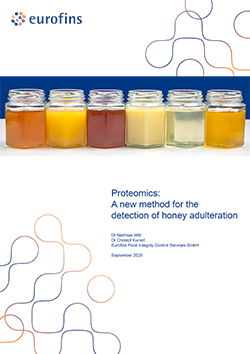Proteomics as a new tool for the authenticity of honey

New specific and selective method for detecting foreign enzymes in honey
Sep 2025. Proteomics has been a commonly used method in diagnostics for years. Now, Eurofins Food Integrity Control Services has established this method for the detection of foreign enzymes in honey. Due to its high selectivity and sensitivity, not only adulteration of honey can be detected. This method can also specify the exact foreign enzyme the honey has been adulterated with. Furthermore, due to the procedure (digestion of proteins), denatured enzymes (proteins) can also be detected, which are not visible for common methods for enzyme detection. Additionally, the content of honey-specific proteins such as the Major Royal Jelly Protein is also determined.
Advantages of proteomics in a nutshell
Artificial enzymes can be added to honey to increase the enzyme activity in order to meet international standards (criteria for amylase/diastase activity) required for honey distribution[1]. Using bottom-up proteomics, these enzymes added to honey can be detected very specifically and selectively. The main advantages of the new method from Eurofins Food Integrity Control Services are:
- Selective and sensitive detection of even very low amounts of non-honey enzymes (even enzymes that cannot be detected with common enzyme activity tests (Phadebas/Schade) can be detected)
- Robust method for foreign enzymes, even after heating.
- Detection of honey-specific proteins (low amounts may indicate honey adulteration).
Here is the white paper for download!
Proteomics: A new method for the detection of honey adulteration
In this document the proteomics workflow is explained in detail.
Additionally, you will find answers to common questions to this topic.
Free download:
Eurofins Whitepaper: Proteomics - A new method for the detection of honey adulteration
How proteomics works
Using this new proteomics method, the proteins are separated from the main components of honey (mainly mono-, di-, and oligosaccharides) first. The proteins are then selectively cleaved into smaller fragments (peptides) of 6-30 amino acids using a protease (digestion). The resulting peptides are separated by chromatography, detected by mass spectrometry, and fragmented by MS/MS. This enables the peptides to be identified and the proteins, including foreign enzymes, to be detected very specifically. Because our focus is on the detection of specific foreign enzymes, the so-called targeted proteomics workflow is used, in which only specific peptides are fragmented. This results in a very high sensitivity of this method.
In addition to foreign honey enzymes, the highly abundant major royal jelly protein MRJP as well as α-glucosidase Apis mellifera and α-amylase Apis mellifera are also measured. This enables irregularities of these proteins, caused by the addition of sugar syrup or rigorous honey processing, to be detected.
Please contact us
You would like to know more about our proteomics analysis and its application options? Please do not hesitate to get in contact with us for further information.



